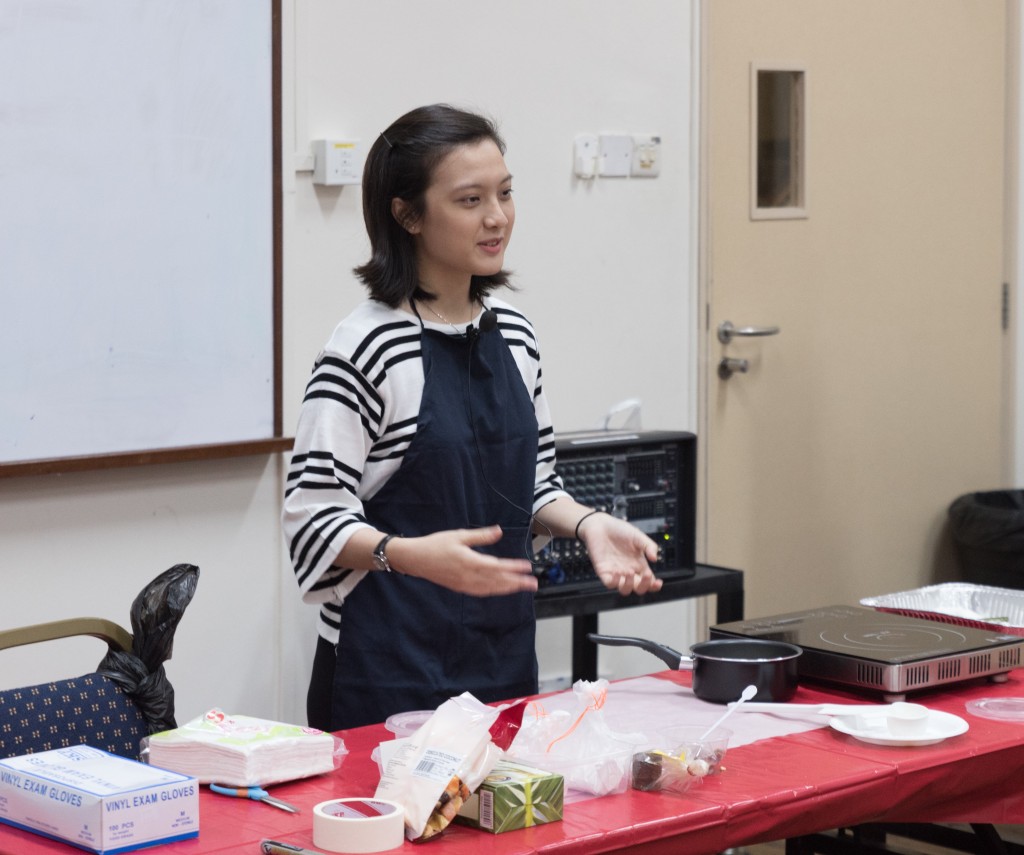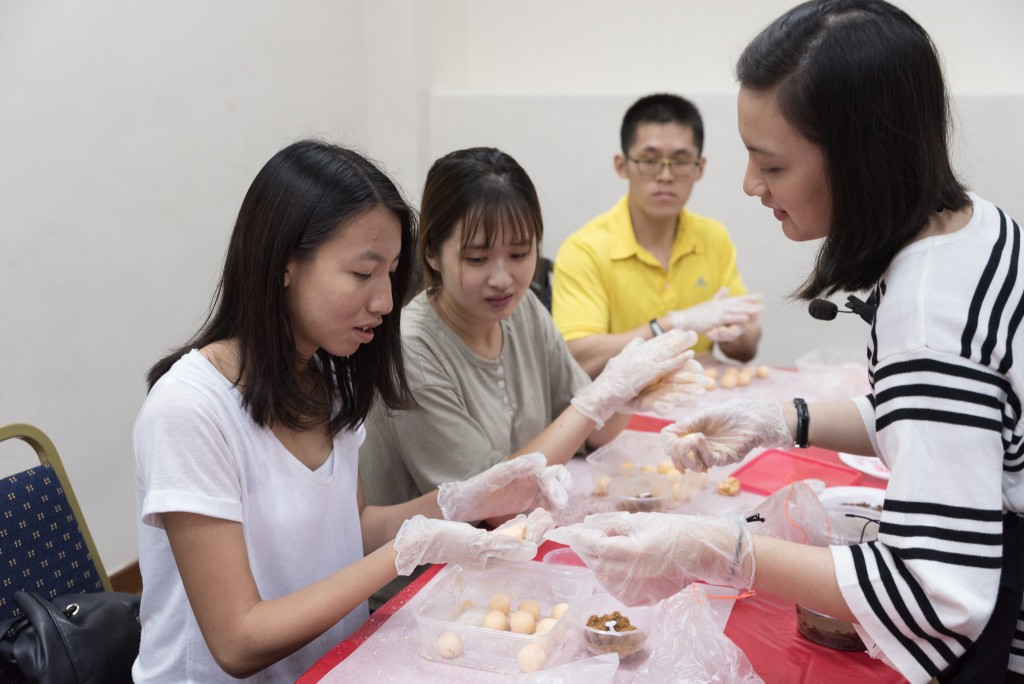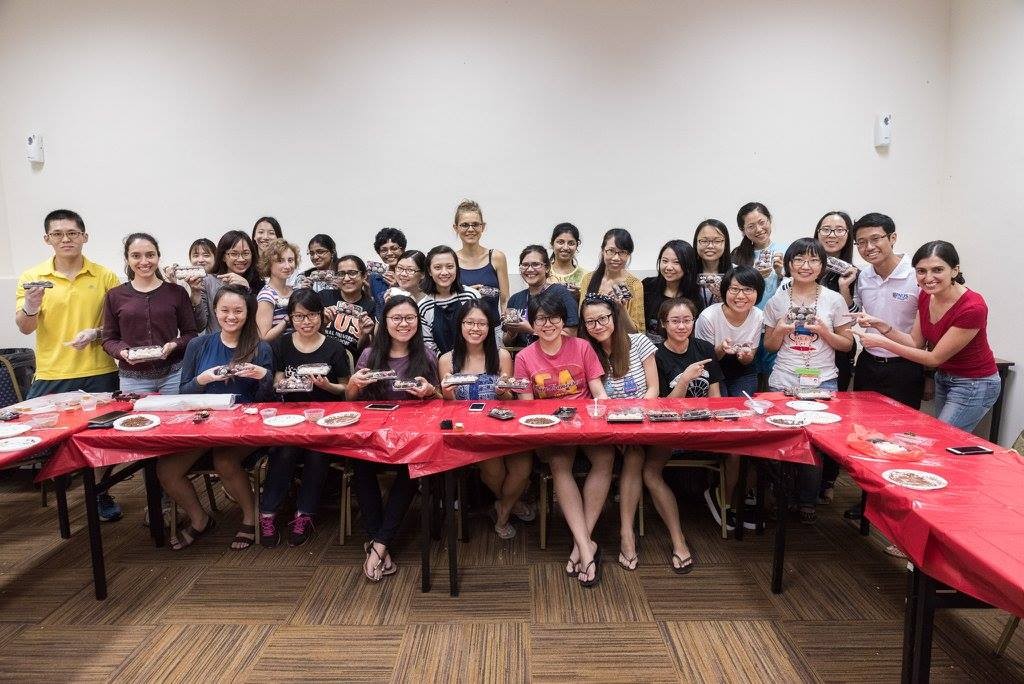The 100MIN’s Ground Up Initiative (GUI) returned this semester with a goal to seek out all those with a sweet tooth, via a dessert making workshop by our very own resident, Amalia Heng, a Year 3 Communications and New Media student. This event was so popular that the registration quota filled up within a day! Participants got an opportunity to channel their inner creativity through the making of ondeh-ondehs and chocolate truffles. We snuck some time out with Amalia, and got her to share her cooking journey, experiences and tips with us. 🙂
- Can you tell us how you ended up conducting this GUI event?
It was actually Dinie, a Resident Assistant from PGP Residence 6, who approached me. I’d only ever told him casually that I liked to cook – I didn’t expect him to remember. But because he remembered, he texted me out of the blue one day, to ask if I was keen on holding a cooking workshop! And as they say, the rest is history.
- We understand that due to time and logistical constraints, the desserts made at the workshop had to be simple ones, but we hear that you can actually make complicated dishes. What’s the most complicated dish that you can make?
Sometimes a dish looks complicated, but it really isn’t, as long as you follow the recipe steps. For me, it’s not a dish that I find complicated to achieve; it’s the technique of “wok hei”. For example, just for frying a simple vegetable dish with wok hei, your fire needs to be turned on high for it to have wok hei, but at the same time you don’t want to burn your vegetables because then it’d become bitter. So, focus and control are very important when cooking. If I’m not focusing when I’m cooking, the dish will end up tasting off.
- Where did you learn to cook?
I watch a lot of TV and YouTube, read a lot of cookbooks, and I learn from my parents as well. Sometimes I also go for workshops. Once I went for a macaroon-making workshop! I also do research and tweak recipes from time to time. I have my own books of workable recipes from all the researching!
- What is your favourite thing about cooking?
I think it’s very therapeutic. For example, in bread making, or anything that involves kneading dough, you’ll find that kneading can be quite relaxing. It helps you de-stress! Cooking is something that I enjoy, and comes naturally to me. I’ve always liked to help my mom in the kitchen since I was a kid, so maybe doing it constantly helped cultivate my interest too. I like to be in the kitchen because I always feel like I’m in the zone!
- When exactly did you start cooking?
When I was five years old. There was a night when my mom was cooking and she asked me to mix raw egg with glass noodles. I used my hands to mix it, started playing around with it, and thought that it was very fun! In primary school I started to experiment by myself. My family was okay with me using the kitchen, so that helps too. My dad is a self-taught chef, so I like to ask for his opinion. I tend to call my mom even now, to ask for tips over the phone!
- We also understand that you were in the i-Lead programme. Can you tell us about your experience?
I want to do something in the food industry, but I haven’t really decided whether it’s manufacturing, opening a café, or something else. Although my major is Communications and New Media, I feel that communication is in every industry, including food. So I signed up with a food start-up under the iLead programme. The company I was with is a salad shop in Ngee Ann Polytechnic. I was given quite a lot of independence from the start, from developing new products or recipes, to managing the store, dealing with suppliers and front line service. I thought it was quite a good experience as you get to learn how to run a business – a food business at that!
- They say “you are what you eat”. If you have to choose one food to represent yourself, what food would you choose and why?
The first thing that came to my mind is char kway teow. This is going to sound quite morbid *laughs* but even though you are what you eat, I have this philosophy that whatever you eat, we’ll all die one day anyway. So why don’t we just enjoy ourselves when we’re alive? Just as long as we eat in moderation, we should enjoy the things that we eat.
Char kway teow represents me, because it is simple yet complex at the same time. It is one dish but in that one dish, there are kway teow and noodles, and many other ingredients like beansprouts, fishcake and cockles. It’s very difficult to achieve the perfect state where the dish is not too dry or too moist, and everything is coated with the sauce – everything just needs to be just right. I’d say it is a good example of where I am in my life right now and what I’m striving to be. I want to be a good char kway teow because it’s difficult to achieve, but fulfilling if I do!
- Do you have tips for fellow students who just started learning to cook?
Start simple. Cooking is actually very easy, you just have to know the pairing of ingredients. I read this book in which every recipe in the whole book only has three ingredients. It’s called Three Good Things on a Plate by Hugh Fearnley-Whittingstall. So it’s really about working with what you have. In Western countries, they use a lot of salmon because they have an abundance of salmon there, but it is very expensive here in Singapore. So go to the supermarket, and see what is cheap, and work from there! For example: dried shitake mushrooms may be just one ingredient, but you’ll soon learn that that it goes very well with leeks, or tofu. Pairing becomes much easier after that. When I stayed in PGPR I had a small steamer. With the right recipes you can just prepare everything, turn on the steamer switch and go for a shower. When you are done with the shower, the food will be ready. It’s about going back to the basics, not trying to be overly fancy!
Do you have a growing interest or a burning passion you wish to share with like-minded people? We have a platform just for you in the 100MIN Enrichment Series – you can be just like Amalia. Write to us at reslife@nus.edu.sg and let’s talk.


